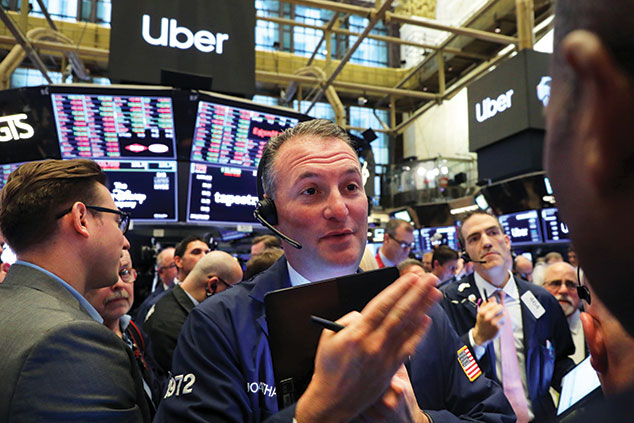
Start-ups are making the most of abundant venture capital and private equity. Last year technology and biotech firms raised $50.3bn through public markets, but $130.9bn through private investors. This is part of a broader “de-equitisation” trend, as more of the economy becomes inaccessible to ordinary retail investors going through public markets. The winners are wealthy private investors who use private markets to buy into high-growth sectors from which smaller investors are excluded.
Capitalism is not what it used to be
The number of stocks being traded in the US fell by half between 1996 and 2016, writes Jonathan Tepper in The Myth of Capitalism. One factor is “extreme corporate cannibalism” as industries become ever more concentrated and competition declines. Google, for example, has purchased 234 companies since 2001. There are fewer listed firms today than in the early 1970s, even though the US economy was one-third as big then. On the current trend, by 2070 America “will only have one company per industry”.
The trend towards private capital has been driven by our era’s “unusually low interest rates”, says Buttonwood in The Economist. With miserable yields on stocks and corporate bonds, “even staid old pension funds” have turned to private markets in search of better returns. Private financing suits many companies just fine, says Frank Partnoy in The Atlantic. Going public costs millions of dollars in fees from bankers and lawyers and requires compliance with stringent disclosure requirements every quarter. A public company must open its books to “analysts, activist investors, the media, and short sellers”. Even businesses that are publicly listed have helped drive the de-equitisation trend, adds Richard Henderson in the Financial Times. Last year saw US companies spend $806bn buying back their own stock. That reduces the number of shares in circulation.
Britain leads the world
This is not only an American trend. Citigroup data shows that Britain’s equity market is the fastest shrinking in the world, says Ksenia Galouchko on Bloomberg. Depressed valuations have fuelled the biggest set of UK share buybacks since 2008 ($45bn in the year to June). Fewer firms are going public amid Brexit jitters.Foreign buyers are also swooping in. Last year saw the $39bn acquisition of Sky by Comcast and Takeda Pharmaceutical’s $62bn purchase of Shire, two deals that “alone reduced the public UK equity count by 3%”. Investors now have access to a “much smaller part of the corporate universe”, says Duncan Lamont of Schroders. So public-market investors may well end up with lower long-term returns.
The boom in private equity
The flipside of de-equitisation and the decline of public markets is an increasingly busy private market. That helps explain why private-equity deals have soared to the “highest level since the lead-up to the global financial crisis”, say Javier Espinoza and Eric Platt in the Financial Times.
The value of leveraged buyouts hit $256bn in the first six months of this year, according to Refinitiv data. That is the second-biggest first-half figure on record after 2006. This kind of deal often involves a private firm taking a listed one private. “The buyout boys” are “back to rock the stockmarket”, says Christopher Williams in The Daily Telegraph. Last year, worldwide public-to-private takeovers reached their highest level since 2007, according to Bain & Company. One of the most eye-catching deals was KKR buying out German news publisher Axel Springer.
Expect more: investment bankers talk of a “wall of money” waiting to be deployed. One reason for that is that debt for leveraged buyouts is set to get “cheaper still as central banks prepare to loosen monetary policy again. That will only add to the firepower of private-equity firms as they run the numbers on more public companies”. A stockmarket setback, meanwhile, would also entice bids. It may not be too long before another big name or two disappears from the mid-cap or blue-chip indices.